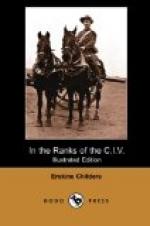I feel no animosity to any one. Infantry, no
doubt, get the lust of battle, but I don’t for
my part experience anything like it, though gunners
tell me they do, which is natural. One feels
one is taking part in a game of skill at a dignified
distance, and any feeling of hostility is very impersonal
and detached, even when concrete signs of an enemy’s
ill-will are paying us noisy visits. The fact
is—and I fancy this applies to all sorts
and conditions of private soldiers—in our
life in the field, fighting plays a relatively small
part. I doubt if people at home realize how much
in the background are its dangers and difficulties.
The really absorbing things are questions of material
welfare—sordid, physical, unromantic details,
which touch you at every turn. Shall we camp
in time to dry my blankets? Biscuit ration raised
from three to three and a half! How can I fill
my water-bottle? Rum to-night! Is there
time for a snooze at this halt? Dare I take my
boots off to-night? Is it going to rain?
There are always the thousand little details connected
with the care of horses and harness, and all along
the ever-present problem of the next meal, and how
to make it meet the demands of your hunger. I
don’t mean that one is always
worrying
about such things. They generally have a most
humorous side, and are a source of great amusement;
on the other hand, they sometimes seem overwhelmingly
important. Chiefly one realizes the enormous
importance of food to a soldier. Shortage of sleep,
over-marching, severe fighting, sink into insignificance
beside an empty stomach. Any infantry soldier
will tell you this; and it is on them, who form the
bulk of a field force, that the strain really tells.
Mounted men are better able to fend for themselves.
(I should say, that an artillery
driver has
in the field the least tiring work of all, physically;
at home, probably the heaviest.) It is the foot-soldier
who is the measure of all things out here. In
the field he is always at the extreme strain, and
any defect of organization tells acutely and directly
on him. Knowing what it is to be hungry and tired
myself, I can’t sufficiently admire these Cork
and Yorkshire comrades of ours, in their cheerful,
steady marching.
By the way, the General was giving orders close to
me this morning. He said to our Major, “Your
guns are the best—longest range; go up
there.” So the Lord Mayor is justified;
but the special ammunition is a great difficulty.
This, however, is only a matter of organization.
As to the guns themselves, we have always understood
that the pattern was refused by the War Office some
years ago; it would be interesting to know on what
grounds. They are very simple, and have some features
which are obvious improvements on the 15-pr.
There was a serious alarm of fire just now. There
is a high wind, and the grass is unusually long.
A fire started due to windward, and came rushing and
roaring towards us. We drivers took the horses
out of reach, and the gunners and infantry attacked
it with sacks, etc. But nothing could stop
it, though by great efforts they confined its width,
so that it only reached one of our waggons and the
watercart, which I don’t think are damaged.
No sooner well past than fellows began cooking on
the hot embers.—Stayed here all day, and
unharnessed and picketed in the evening.




